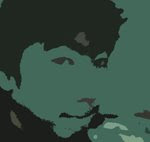Friday, January 23, 2009
I am back!
Anyway, I am back! I'll try to update something everyday, despite the fact that another assignment ( an Environment Evaluation Report, about 50 thousand characters @_@) will virtually take all my time, some of my eyesight.
So, later~
Monday, January 5, 2009
2008 Chinese Internet Slang Glossary,Part II
Simple and Naïve
Definition: Sarcasm, similar to its literal meaning, ridicules acts or ideas that someone disapproves.
Origin: After the Edison Chen Photo Scandal, the leading lady Gillian Chung made an announcement:” I admit I was once simple and naïve, but now I’m already a grown up.” Netizens jeered at it, and mischievous distortions were all over the internet, making these words insanely epidemic.
e.g.: You took that seriously?How simple and naïve!
8. 囧 Jiǒng
Definition: Originally means light or bright, but because its shape resembles a helpless, brows-knitting face, people use it to express melancholy, sorrow, helplessness, wordlessness, and other emotion.
Origin: Although it was an ancient Chinese character, the source of its popularity was Japan, After spreading to China, people use it together with Orz (a Japanese emoticon representing a kneeling or bowing person, showing failure and despair), as囧rz, began its popularity among anime fans from 2004.
9. 雷
Thunder
Definition: Accidentally saw something unpleasant, feeling intensive discomfort.
Origin: Being thundered. Japanese Anime, electrified, representing intensive electric shock, used when anime fans see something surprising or nasty, they are “electrified”, or “thundered”.
e.g.: She was unfortunate enough to be well thundered by the novel, crisp skin and tender meat.
10. 山寨
Mountain Village (counterfeit)
Definition:Piracy or forgery
Origin: An industrial phenomenon launched by folk IT force, leaped into mass attention under the name of “Mountain village mobile phone”, hereafter, derivatives such as mountain village stars, mountain village buildings emerges endlessly.
Even came out the Mountain Village Dream of the Red Chamber, the Mountain Village Lecture Room, etc. Such amateur activities are called Mountain Village Culture, and are deemed as a popular fighting spirit against authorities and elites.
e.g.: The Mountain Village Spring Festival Night not only enjoys online live broadcast, even TV stations offer rebroadcasting contracts.
Sunday, January 4, 2009
2008 Chinese Internet Slang Glossary,Part I
1.叉腰肌 chā yāo jī
Arm Akimbo Muscle
Definition: n. Satirize the National Football Team. It can also be extended to those who pretend to be experts.
Origin: During the 2008 Olympic Game, the president of the Chinese Football Association chastised members of the China Women Football Team for their lacking fighting spirit and technique, and believed that those girls were badly in need of exercising their “Arm Akimbo Muscle”, a term that confused all. From that time onward, “Arm Akimbo Muscle” became a smash phrase, and pranks material for numerous netizens. Certainly, the National Football Team lost their pants this year, and was basically a laughing stock, “Arm Akimbo Muscle” is just one of them.
e.g. : Football, fighting for the Arm Akimbo Muscle!
2.打酱油
Buy Soy Sauce
Definition: Expressing that one has no knowledge of some thing, or have no comments, an attitude of minding one’s own business.
Origin: From TV news, when a correspondent was interviewing a
Later, the phrase was widely used in reply posts and other things, adaptation became fashionable for a time, even derived Soy Sauce Group and other internet slangs.
e.g.: I know nothing about it, I’m a professional soy sauce buyer.
3.范跑跑
Run Run Fan
Definition: Describe that someone flees really fast, and in a innocent manner.
Origin: RunRun Fan’s true name is Fan Meizhong, born in
Because of this subversion of morality, he became a “star” on the internet.
e.g.: At a glimpse of sister Furong, I Ran Ran Faned right away.
4.俯卧撑
Push-up
Definition:Being inconvenient or unwilling to comment, in lieu of phrases like “路过 pass by”, “飘过 float by”.
Origin: 3 days after the June 28th, Weng’an Incident, Guizhou Authority called a press conference to reveal the “truth” of the incident. When describing the situation of that day, official adopted the suspect’s testimony that, Li Shufen committed suicide, because when she was about to jump into the river, her friend Liu was doing push-ups on the bridge!
Several minutes later, Tianya Forum had a post, “I’m here to do some push-ups.” Overnight, “Push-up Posts” was everywhere on the internet.
e.g.: Stop fighting, why don’t we just do some push-ups?
